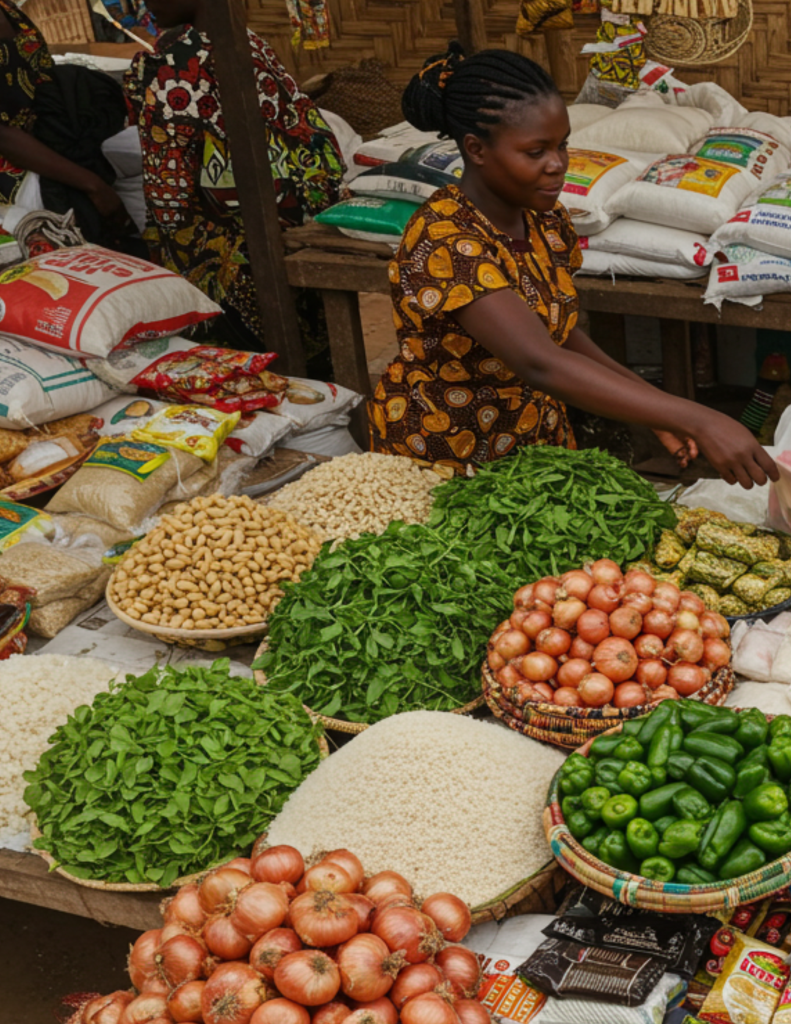
Geopolitical conflicts like the Russia-Ukraine war significantly disrupt global trade by affecting supply chains, especially for essential goods like wheat, corn, fertilizers, and pharmaceuticals. Developing countries, including many in Africa, remain heavily reliant on imports due to underdeveloped infrastructure and production capacity. This reliance makes them particularly vulnerable to external shocks, highlighting the urgent need for local investment in critical sectors like agriculture and health.
The AfCFTA has the potential to reduce reliance on global markets and strengthen regional trade. However, its impact is currently limited by widespread insecurity across Africa and the lack of focus on supply chain infrastructure.
Nigeria's supply chain infrastructure is severely lacking across all fronts, from roads, ports, and bridges to storage, distribution, and data systems. While the government bears responsibility for setting the right conditions, the citizens also contribute to the problem by failing to demand accountability and often circumventing systems. Solving these challenges will require not just physical infrastructure upgrades, but a fundamental behavioural and systemic reprogramming involving both government and the public.
Reducing food inflation in Nigeria hinges on political will, effective policy implementation, and recognizing food security as a national security priority. There is a need for coordinated efforts across federal, state, and local governments, particularly in improving food storage and supply chain infrastructure. Without robust systems to store,, transport, and ensure the nutritional quality of food is preserved, inflation will persist due to scarcity and inefficiencies

Watch Previous Episodes Here
We are excited to share the latest episode of Kingsgate Brief, the official podcast series of Kingsgate Advisors Institute.
In this episode titled “Building Resilience: How Africa Can Secure Its Food Future in a Fragmented Global Economy,” we dive into the systemic challenges undermining Africa’s food security — from weak infrastructure and poor storage to data gaps, insecurity, and accountability failures.
Host: Dr. Oluwanbepelumi Olanubi, Executive Director of Kingsgate Advisors Institute.
Guest: Major Adebayo Adeleke, Founder of the Supply Chain Research and Innovation Hub (SCRIH).
They unpack how we can build a more resilient supply chain that protects Africa and Nigeria’s food security.
Tune in now and explore what it really takes to feed a nation.
EPISODE SUMMARY:
The episode discusses the issue of food insecurity in Africa, the causes and the solutions and the need to build resilience in the supply chain to tackle this food insecurity problem.
Dr. Oluwanbepelumi Olanubi : Hi everyone, good morning, good afternoon and good evening from wherever you’re tuning in to join us for another insightful episode of Kingsgate brief. Today we are going to discuss a very topical issue that I believe that affects everyone, myself, you and every man on the street. This issue is very topical for Nigerians and also within the African context. Also, today, I have with me a notable and a distinguished guest who I’m going to read his profile shortly and basically today we’ll be talking about building resilience. How can Africa secure its food culture in a fragmented global society? As we know, the world order is changing and a lot of things from the geopolitical scene are changing the way nations see themselves and we are seeing this regional block being formed by other parts of the world.
So the question to us as a region, as a country and even as a continent, is how secure are we when it comes to food and how are we able to build resilience given the context of all that is happening? And to discuss this and more I have with me Major Adebayo Adeleke. Adebayo Adeleke is an experienced supply chain professional with knowledge in risk management, security, geopolitics, indigenous supply chain, security, and trade.
He has served for 20 years as a combat veteran in the United States Army. His policy briefs on supply chain, security, and other resources have been featured in the London School of Economics, the African Report, and others. His desire to provide supply chain intelligence for stakeholders to make informed decisions concerning trade and supply chain in the continent led him to start Supply Chain Africa (SCA) – the supply chain data bank for Africa. He is the founder of the Supply Chain Research and Innovation Hub (SCRIH), a transformative initiative set up to address the intricate challenges facing supply chain management in Africa. His desire to put an end to the food security challenge in Nigeria led him to start the Nigeria Food Security Project, the most comprehensive research project addressing all facets of food insecurity in Nigeria. The Nigeria Food Security Project seeks to establish food security as a national priority, advocate for food security in national security policies and frameworks, promote reforms to support sustainable agricultural practices and food distribution systems, develop necessary frameworks to support building Nigeria’s food security and resilience, develop Nigeria food security and resilience index, develop food dashboards for Nigeria at national and sub-national levels, and create a living food security strategic plan for Nigeria.
Ladies and gentlemen, our amiable audience, please join me to welcome this evening, Major Adebayo Adeleke, good evening, sir and thank you for joining us today.
Major Adebayo Adeleke: Dr. Oluwanbepelumi, this is the first time I’ve heard somebody actually, you know, your name is crafted differently, Oluwanbepelumi, which is the right pronunciation actually, is the full pronunciation of it. Doc, thank you for having me and deeply appreciative of this, you know, I won’t be anywhere else but here. Thank you for what you’re doing, for the cause, because everybody that is in the cause of, you know, helping us to evangelise the cost of supply chain on the continent is my friend, so thank you for being a friend and an ally in this journey, so awesome.
Dr. Oluwanbepelumi Olanubi: All right, all right, I’ve actually been looking forward to this because I met you like over a year ago and I’ve been following your work and I must say that you are a thought leader when it comes to discuss like this. So without further ado, let’s dive right into it. So, I’m going to start with this question and I’d like to take your perspective as to how has Africa’s heavy reliance on global food and inputs, particularly foods like wheat, rice, fertilisers, how has it exposed the continent to external shocks, giving the example of the likes of Russian-Ukraine war and other trade wars that we’ve seen, what are the lessons that should shape the future direction in terms of costs?
Major Adebayo Adeleke: Ah, yes, you know, conflicts, any conflict rather, Russia-Ukraine war as a prime example, any conflicts, any geopolitical inference, any geopolitical incident and event will shape any course of trade. Trade, as you know, you are an economist by trade, you know, it’s a very interesting construct. Often, I believe, I always said trade runs on a train track of supply chain, you know, there will be no trade without supply chain and vice versa, so it runs on so many things, but the train track supply chain, so the wheat, the corn and several cash crops that are actually being used for our daily consumption and fertilisers, just like any conflict and for any developing country, it exposes the period, because not only that, we can actually produce this commodity, but because of our developmental issues, it’s quite impossible not to rely on importation of a lot of these things. Inoculation drugs for livestock is dependent on foreign pharmaceuticals, not that we cannot produce it, but there has been the less of things on our hierarchy of needs.
First things first, if you look at Maslow’s hierarchy, I’ll try not to, for the most especially, to use Maslow’s hierarchy of needs, but if you can actually compare Maslow’s hierarchy of needs to a particular adage in Yoruba land, if you may permit me, won ní ti oúnje bá ti kúrò nínú ise, ise ́bùse ́ (true) exactly, so Maslow might come up with his own construct, but Yoruba has always in its own adage, believes that food is also, is part of the physical element, those are the things you need to security, and physical security and all those things, those are the nature of things that need to be taken care of, so in our hierarchy of needs, we can’t feed ourselves first, we can’t do all those things, so talk less of other industrialisation, inoculation of things, so those are things that we’ll continue to rely on until we get to that level of building those networks and infrastructures that support this, continue to rely on foreign importations to be able to support this, and that’s why any conflicts of any kind, either Gaza and Israel, either Ukraine and Russia, either Pakistan and India, or any other skirmishes that is going on around the world, it’s definitely going to affect, you know, supply chains coming, or trade coming into Africa, especially if any of the crops that we’re reliant on passes through those trade routes, it will be of rather an interesting issue to deal with, so yeah.
Guest

Executive Director - Kingsgate Advisors Institute

Founder of the Supply Chain Research and Innovation Hub (SCRIH)
Address:
54B, Adeniyi Jones Avenue, Ikeja, Lagos, Nigeria.
Contact:
+2347033052120
info@kingsgateinstitute.org
© Kingsgate Advisors Institute. All rights reserved.
Address:
54B, Adeniyi Jones Avenue, Ikeja, Lagos, Nigeria.
Contact:
+2347033052120
info@kingsgateinstitute.org
© Kingsgate Advisors Institute. All rights reserved.